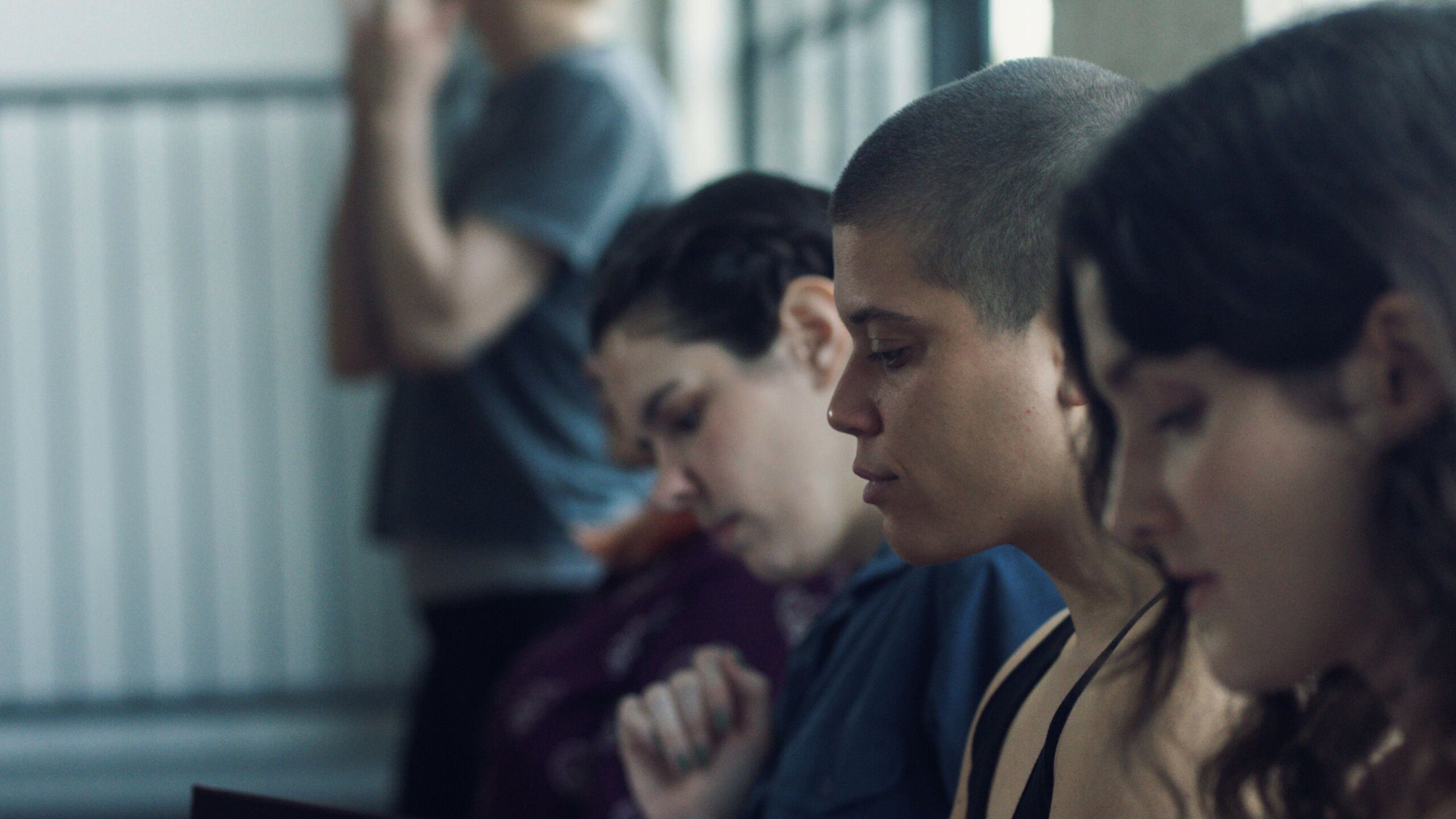“There’s just such chemistry and freedom in being around someone else who understands the experience,” says Really Happy Someday director J Stevens. “You get to drop all your walls and exist and have common experiences—it is so powerful.”
Stevens, speaking with Xtra via Zoom ahead of Really Happy Someday’s world premiere at the Toronto International Film Festival, notes the sparks that fly between the film’s lead, Z (Breton Lalama) and his onscreen colleague Santi (Xavier Lopez). The film follows Z as he finds himself literally and figuratively in transition, taking a job with Santi at Squirly’s Bar on Toronto’s Queen Street West when his career in musical theatre hits a bittersweet hurdle.
Z has recently started taking testosterone injections and his body is changing. Really Happy Someday conveys this quite poignantly in its opening scene as Z’s voice cracks while performing “On My Own” from Les Misérables during an audition. Frustrated, he tries the song again, but just can’t quite capture the vocal range. As Z works with a vocal coach to hit the right notes, he draws strength from Santi’s own confidence and experience as a trans man.
Really Happy Someday offers a striking metaphor for what it means to find one’s voice anew. Stevens creates an authentic portrait of this journey by working in close collaboration with Lalama, who co-wrote the script. The film taps into the vulnerability of baring oneself in a moment of change and self-doubt. In a film with no chance for reshoots, they capture Z’s story as Lalama’s own body evolves with testosterone treatment. In a way, Really Happy Someday is the Boyhood of a trans experience as audiences get to see first-hand how one person’s transition looks and sounds.
“Finding your authentic voice, finding the stories that you feel like you authentically can tell, is something everyone is doing all the time, whether it is a creative endeavour or with your life,” says Stevens. “I hope there’s some universality to that experience.”
Xtra caught up with Stevens to learn more about the artistic process of Really Happy Sunday and making a film that is intimate, personal and grounded in the experiences of its creators.
What was the inspiration for the story in Really Happy Someday?
I’d been trying to write a similarly themed, but different, version of this film for years and banging my head against a wall, being like, “Why is this not quite working?” Breton, the lead and my co-writer, and I had been following each other on Instagram for a while. One day by chance we ran into each other on our way to work. That day happened to be his one year on-testosterone anniversary.
That night, I was looking at his Instagram profile and he had posted about 50 stories about his vocal transition. He had posted, “Ask me anything.” He was answering all these questions that folks had and was posting videos of himself singing before starting testosterone, and he was trying to hit a note. I reached out to Breton on Instagram and said, “It was great meeting you yesterday. Would you ever want to co-write a feature film with me and star in it?” We wrote a draft on Zoom together, and then we started filming quickly so we wouldn’t lose what Breton was authentically going through.
In the film, we see Breton’s face, body and voice change. Does this mean you were shooting sequentially? How did Breton’s own journey factor into the production process?
It was a fun, unique challenge and puzzle. We knew from the beginning that there was no going back, ever. There were no reshoots or anything like that. We shot in two- to four-day chunks throughout a year. We would play around with the sequence within those days, but as you see the seasons change, that is how we shot it. You’re seeing and witnessing those authentic changes in Z and his voice and his body, which adds a unique element to this film and felt important for Breton and me to capture, versus trying to fake it in the normal two- to four-week shoot.
When you’re capturing someone’s body as it changes and evolves, how is it going back and seeing the starting point together?
I literally opened the film two days ago to send it to someone and it’s a bit jarring. It’s cool to see how far Breton’s come since we began filming, which was almost exactly two years ago. For myself, I’m just an observer. I applaud his vulnerability in terms of what we captured. From the beginning, I said, “Just because we’ve captured it doesn’t mean it has to be in this film.” I think of the trans tape scene [in which Z changes the tape binding his chest] for example, as one of those scenes. He had final approval to make sure that it still felt okay to represent his body in that way. I’m excited for audiences to witness the authenticity of that and hopefully see that it’s not so scary because I think it can be so politicized.
But there’s also a nice consistency in the way we frequently see Z shot from behind, looking out at the horizon, so he’s framed in silhouette, which provides continuity for expressing his sense of self.
For me, it’s about playing with observation and voyeurism and perspective. There’s not a single scene that Z isn’t in in this film. We never cut away to a different character and give them their own moment. Breton and I talked about feeling very reflective about where you are and where you’ve come from: “Is this the right choice for myself?” Even though you’re becoming at home in your body, you’re losing control of the one thing you could always trust in: your voice. Breton talked about how going to the water a lot and having that quiet time to check in was such a big part of his journey. The seeing-from-behind part is to put yourself in his shoes for those moments and to witness this person and this moment of quiet reflection.
There’s such intimacy and great chemistry between Z and Santi, but also a sense of self-discovery between these two trans characters in the film. What was your approach to the relationship?
It was important to show in subtle ways how attraction can change during transition. We have Danielle [Z’s girlfriend] at the beginning and then Santi near the end, and it felt important to represent that because it is such a common thing. We fleshed out the portion of the script we were about to shoot because we wanted to stay open to what we were learning as we went, both as filmmakers and in terms of what was actually happening in our lives.
How much did the story change from the draft you wrote before approaching Breton to the final product we see now?
We were editing as we went, which was a luxury where you can ask what’s working as you go. One portion was an idealized version of what Breton had hoped his vocal transition would look like, that it’s been two months and he can sing beautifully and all his problems are gone. I remember getting a voice note before a shoot where Breton said, “I can’t sing anything,” and him just having a moment of asking, “Did I do the right thing?”
It was important for the film not to focus on trauma, to show joy, to show happiness, to show potential and to show hope. But I think we were shying away from the reality that there are moments that are super fricking hard. After that voice note, we had a conversation and I was like, “I think this [inner dilemma] has to go in the film and we’ll make sure there’s still hope and joy in those moments, but I think it’s important to put reality in.”
To what extent does reality come into the vocal coaching scenes?
Those scenes were some of my favourite to film. Breton and Ali Garrison, who played Shelly [the vocal coach], their in-person relationship is so beautiful. Ali is Breton’s vocal coach in real life, so all of those scenes are very much scripted, but they’re inspired by what those lessons authentically are like. Those are fully performed, too, those are scripted lines, but they’re inspired by their sessions. The warmth that Ali has just radiates off of her.
Why “Favorite Places” from the musical Ordinary Days for Z’s vocal coaching song? That has a nice euphoric element, but it’s also really sad as he sings it over and over in the coaching scenes, trying to hit the notes.
That juxtaposition is the reality of the situation. We threw around a lot of songs for what the ideal could be. It’s all about yearning for that place that you can’t quite get to, but still enjoying the journey. It felt like the perfect encapsulation of Z’s journey. Starting with “On My Own” is such an iconically female song. When I see him singing that at the beginning of the movie, I feel viscerally uncomfortable. It just all feels so wrong, knowing Breton and Z. We wanted a song that was a male song to sing that captured all those pieces of him. We reached out to Adam Gwon, the composer of “Favorite Places,” with a note about why we thought it was the perfect song for the film. He sent the loveliest email back and, at that moment, we saw there could be no other song for this film.
How much of J is there in Z?
A lot of it, minus the vocal transition. I can’t sing to save my life, as much as I would love to be a musical theatre star. It’s a non-musical musical movie. The vocal transition doesn’t resonate with the J aspect of it, but in terms of fighting to be the most authentic version of yourself and the relationship stuff, that does. A lot of people assume it’s all inspired by Breton, or purely fictionalized, but there’s a good amount of J in there.
Your work with Spindle Films has been playing a role in this effort to improve representation through a mentorship program for gender-diverse filmmakers. We often have conversations about the people at the top, but what advice do you give to emerging filmmakers who are starting out and could one day be those future leaders?
Listen to the voice in your head that’s guiding you. It’s so easy to get off track and get swayed by what you’re told folks want to see on TV or that folks want in terms of the environment. It can be done differently than it has been done in the past. Finding that community and knowing that you’re not one of the only folks doing it is really helpful. As soon as you start to feel isolated and that you’re the only person telling these stories or fighting for change, you can start to feel kind of alienated from the industry as a whole. I’ve seen that happen a lot. Even if you’re the only one on set, it’s important to have that network of folks you can text or call to say, “This is what’s happening today.” It’s important to vent it out and know that your stories are valid and deserve to be told.
Really Happy Someday screens at TIFF 2024.
This interview has been edited for length and clarity.


 Why you can trust Xtra
Why you can trust Xtra


